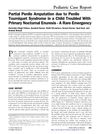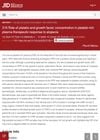 9 citations,
May 2021 in “Immunological Reviews”
9 citations,
May 2021 in “Immunological Reviews” Different types of fibroblasts play various roles in kidney repair and aging, and may affect chronic kidney disease outcomes.
 9 citations,
September 2014 in “Cancer Epidemiology, Biomarkers & Prevention”
9 citations,
September 2014 in “Cancer Epidemiology, Biomarkers & Prevention” Certain genetic variants in the androgen receptor are linked to higher PSA levels, potentially affecting prostate cancer screening outcomes.
 8 citations,
April 2021 in “Medical journal of the Islamic Republic of Iran”
8 citations,
April 2021 in “Medical journal of the Islamic Republic of Iran” Taking finasteride can partially improve oxygen levels in hospitalized male patients over 50 with COVID-19 pneumonia, but it doesn't affect other outcomes like death rate or hospital stay length.
 8 citations,
March 2006 in “Seminars in Cutaneous Medicine and Surgery”
8 citations,
March 2006 in “Seminars in Cutaneous Medicine and Surgery” Hair transplantation has improved to look more natural, but managing patient expectations and using precise techniques are key for the best outcomes.
 8 citations,
January 1998 in “Journal of Cutaneous Medicine and Surgery”
8 citations,
January 1998 in “Journal of Cutaneous Medicine and Surgery” Hair transplantation is effective for baldness, with new methods improving results, but staying updated is crucial for patient outcomes.
 6 citations,
January 2013 in “Urology”
6 citations,
January 2013 in “Urology” An 8-year-old boy with bed-wetting issues suffered a severe penile injury from tying a thread around his penis, requiring urgent medical treatment to avoid worse outcomes.
 5 citations,
May 2023 in “Frontiers in immunology”
5 citations,
May 2023 in “Frontiers in immunology” Environmental factors like diet and vitamin levels, especially Vitamin D, can affect autoimmune diseases differently, with lifestyle changes potentially improving outcomes.
 5 citations,
February 2010 in “Expert Review of Dermatology”
5 citations,
February 2010 in “Expert Review of Dermatology” Treating both the mind and skin together, especially by managing stress, can greatly improve outcomes for skin disorders linked to psychological issues.
 4 citations,
November 2021 in “Frontiers in endocrinology”
4 citations,
November 2021 in “Frontiers in endocrinology” Children and adults with Cushing's disease show different symptoms and males have more severe cases; surgery outcomes can be predicted by certain factors.
 3 citations,
August 2011 in “InTech eBooks”
3 citations,
August 2011 in “InTech eBooks” The document concludes that skin grafts are essential for repairing tissue loss, with various types available and ongoing research into substitutes to improve outcomes and reduce donor site issues.
 1 citations,
April 2024 in “Archives of disease in childhood”
1 citations,
April 2024 in “Archives of disease in childhood” Many children and teens referred to gender services receive hormone treatments, but more research is needed on their long-term care and outcomes.
 1 citations,
August 2021 in “Primary Care Diabetes”
1 citations,
August 2021 in “Primary Care Diabetes” Pregnant women with COVID-19 and gestational diabetes may face severe complications, and more research is needed on their outcomes.
 1 citations,
October 2020 in “Research Square (Research Square)”
1 citations,
October 2020 in “Research Square (Research Square)” Men with male pattern baldness had worse COVID-19 symptoms, but early treatment with certain drugs improved outcomes for all.
1 citations,
October 2015 in “Joint bone spine” Membership in a self-help organization is linked to being better informed and having a higher education, but it doesn't clearly affect disease outcomes.
 1 citations,
March 2009 in “Hair transplant forum international”
1 citations,
March 2009 in “Hair transplant forum international” The author believes that in hair restoration, creating an illusion of coverage is more important than perfection, and managing expectations and improving average results should be prioritized over promising unrealistic outcomes.
 1 citations,
December 2006 in “Burns”
1 citations,
December 2006 in “Burns” New therapies for burn wounds show promise in reducing pain, infection risk, and improving healing and physical outcomes.
 February 2024 in “BioMetals”
February 2024 in “BioMetals” Heavy metals like arsenic, cadmium, and lead can increase cancer risk and worsen outcomes.
 September 2023 in “Chinese Medical Journal”
September 2023 in “Chinese Medical Journal” Robotic surgical systems are being used more in plastic and reconstructive surgery due to their precision and control, improving patient outcomes and satisfaction, despite challenges like high costs.
January 2023 in “Figshare” Triple therapy with clobetasol, hydroxychloroquine, and N-acetylcysteine is recommended for better outcomes in treating lichen planopilaris.
 September 2022 in “Plastic and Reconstructive Surgery”
September 2022 in “Plastic and Reconstructive Surgery” Baricitinib helps with severe hair loss, negative-pressure therapy lowers hernia recurrence, tranexamic acid reduces bleeding, robot-assisted breast surgery may improve outcomes, and acellular dermal matrix could decrease breast reconstruction complications.
 August 2022 in “Journal of Contemporary medical practice”
August 2022 in “Journal of Contemporary medical practice” Combining Traditional Chinese Medicine and Western medicine can improve symptoms, hormone levels, and pregnancy outcomes in Polycystic Ovary Syndrome patients, but more research is needed.
 July 2022 in “Journal of Investigative Dermatology”
July 2022 in “Journal of Investigative Dermatology” High platelet numbers in PRP may not be essential for hair growth, and certain growth factors could negatively affect treatment outcomes for hair loss.
 February 2020 in “International Journal of Research in Dermatology”
February 2020 in “International Journal of Research in Dermatology” EPDS is a rare, chronic scalp condition that's hard to treat and needs better awareness for improved outcomes.
 January 2019 in “Springer eBooks”
January 2019 in “Springer eBooks” Micrografts are useful for healing wounds, regenerating bone and periodontal tissues, and improving hair transplantation outcomes.
 August 2018 in “Journal of The American Academy of Dermatology”
August 2018 in “Journal of The American Academy of Dermatology” Regular follow-up visits, especially with dermatologists, can lower death rates for melanoma patients, with socioeconomic factors also affecting outcomes.
 March 2017 in “International journal of basic and clinical pharmacology”
March 2017 in “International journal of basic and clinical pharmacology” Skin reactions to drugs are most often rashes caused by antibiotics, with nevirapine being the most common culprit; knowing these patterns can improve treatment and outcomes.
 January 2017 in “International journal of transplantation & plastic surgery”
January 2017 in “International journal of transplantation & plastic surgery” Hair restoration techniques have improved over time, focusing on better results and less scarring, but skilled doctors are essential for natural-looking outcomes.
 April 2016 in “Journal of Investigative Dermatology”
April 2016 in “Journal of Investigative Dermatology” Tumor cell adhesion is linked to higher risk of SLN metastasis and melanoma recurrence, and a model including these factors predicts these outcomes better than one with just clinical data.
 April 2016 in “JAMA Dermatology”
April 2016 in “JAMA Dermatology” Acne is not a key diagnostic feature for PCOS, postadolescent men with acne may have insulin resistance, melanoma patients often have few moles, tumor size in CSCC indicates higher risk of serious outcomes, and hidradenitis suppurativa is linked to higher risk of heart problems and death.
 August 2013 in “Fertility and Sterility”
August 2013 in “Fertility and Sterility” High levels of fatty acids are linked to increased androgen production and inflammation in women with PCOS, which may affect IVF outcomes.




























